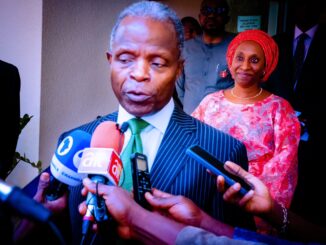
By Gideon Maxwell
August 11, 2024
Former Vice President Yemi Osinbajo has stated that Nigeria can rise again if churches in the country shift their focus from preaching prosperity to emphasising the values of hard work, compassion, and service to the community.
Professor Osinbajo made a compelling appeal to churches across the nation while delivering a lecture at the 68th Anniversary and 58th Annual Convention of The Gospel Faith Mission International (GOFAMINT) over the weekend.
He urged them to redirect their focus from the prevailing emphasis on prosperity and wealth accumulation to a more profound commitment to peace, productivity, and community development.
Delivering his address on the theme, “The Christian Faith in the Political Struggles: A Case Study of Nigeria,” Osinbajo expressed concern over the current state of religious messaging in Nigeria.
“If we truly want to see Nigeria rise again and fulfill its immense potential, the church must return to its roots, preaching the values of hard work, compassion, and service to the community,” Osinbajo stated.
He emphasised that it is only through this shift in focus that Nigerians can be inspired to become agents of positive change, rather than mere consumers of the prosperity gospel.
The law professor and also a pastor argued that the obsession with wealth and lavish lifestyles among certain religious leaders has alienated a significant portion of the population, particularly the youth, who are increasingly seeking more meaningful and impactful messages from the pulpit.
Osinbajo emphasised that, for too long, churches have become ensnared in the pursuit of personal prosperity and material wealth, neglecting their fundamental mission to promote peace, unity, and the holistic development of society.
ALSO READ: Africa’s youthful talent, innovative spirit Key to continent’s prosperity — Osinbajo
He further elaborated on the detrimental effects of focusing solely on prosperity, warning that when church leaders place a premium on benefits and rewards, especially among Christians in positions of authority, it hampers national development.
“The people’s mind will be soiled and unable to do what is right,” he cautioned.
Osinbajo pointed out that many prosperous nations around the world have achieved success without abundant natural resources.
He noted, “Many prosperous nations of the world have no natural resources while many nations with many national endowments are lurking in poverty because people do not play according to the rules of hard work and productivity.”
He cited countries in Europe and America as examples of societies that have thrived based on the true gospel of Jesus Christ, combined with virtues such as hard work, integrity, and the protection of the poor.
The former Vice President also raised concerns about the lack of accountability among some religious leaders regarding the sources of wealth among their congregants.
He stated, “Many preachers do not care to question the source of wealth of their members but attribute almost any unexplainable wealth and riches to miracles.” This practice, he argued, undermines the integrity of the church and its message.
The church’s role in national transformation
Osinbajo concluded his lecture by reiterating the critical role of the church in shaping the moral and ethical landscape of the nation.
He asserted, “The major responsibility of Christians, the responsibility of the church, is propagating the correct version of the gospel of Jesus Christ, and it is that correct version of the gospel of Jesus Christ that transformed other nations of the world.”
He urged church leaders to be mindful of the messages they preach, stressing the need to promote virtues of hard work, integrity, and productivity while also caring for the poor and needy within their communities.
“If we must transform and impact our nations as Christians and as a Church, we must be mindful of the messages we preach,” he emphasised, calling for a collective effort to inspire the populace to become agents of positive change rather than mere consumers of prosperity gospel.




